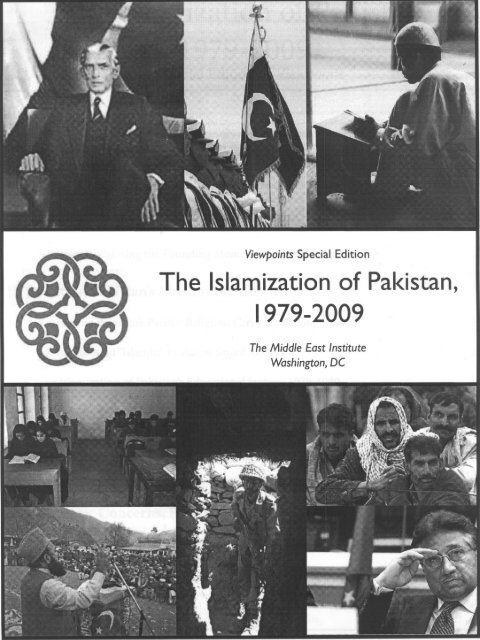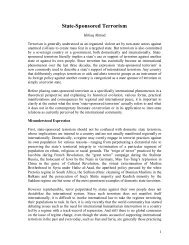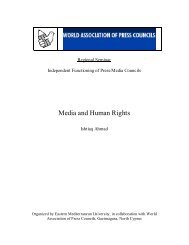Full Text - ishtiaqahmad.com, the official website of Ishtiaq Ahmad
Full Text - ishtiaqahmad.com, the official website of Ishtiaq Ahmad
Full Text - ishtiaqahmad.com, the official website of Ishtiaq Ahmad
You also want an ePaper? Increase the reach of your titles
YUMPU automatically turns print PDFs into web optimized ePapers that Google loves.
Viewpoints Special Edition<br />
The Islamization <strong>of</strong> Pakistan,<br />
1979-2009<br />
The Middle East Institute<br />
Washington,<br />
DC
The Islamization <strong>of</strong> Pakistan,<br />
1979- 2009<br />
A Special Edition <strong>of</strong> Viewpoints<br />
Introduction<br />
7<br />
I. Origins and Consequences <strong>of</strong> Pakistan's Multiple Crises<br />
Post-1979 Pakistan: What Went Wrong, by Touqir Hussain<br />
9<br />
Pakistan's Reverse Revolution,<br />
by Imtiaz Gul<br />
12<br />
Pakistan: Reclaiming <strong>the</strong> Founding Moment, by Suroosh Irfani<br />
15<br />
II. Debating Pakistan's Muslim Identity<br />
Reclaiming Pakistan's Pacifist Religious Creed, by <strong>Ishtiaq</strong> <strong>Ahmad</strong><br />
Moving beyond «Islamic;' by Aasim Sajjad Akhtar<br />
19<br />
22<br />
The Islamization <strong>of</strong> Pakistan's Educational System: 1979-1989<br />
by Nasim Ashraf<br />
Jamaat-e Islami, by Farhat Haq<br />
25<br />
28<br />
The Legacy <strong>of</strong> Bhutto and Zias Contending<br />
by Lawrence Ziring<br />
Visions and Security Policies,<br />
31<br />
III. Domestic Concerns, Regional Implications<br />
Imperialism, Extremism, and <strong>the</strong> Wi<strong>the</strong>ring State, by Imran Ali<br />
Upheaval in West and South Asia: Public Opinion in Pakistan,<br />
by Ijaz Shaft Gilani<br />
36<br />
39<br />
The Middle East Institute Viewpoints: The Islamization <strong>of</strong> Pakistan, 1979-2009. www.mei.edu<br />
5
Reclaiming Pakistan's Pacifist Religious Creed<br />
<strong>Ishtiaq</strong> <strong>Ahmad</strong><br />
If <strong>the</strong>re is a cut-<strong>of</strong>f point in <strong>the</strong> 62-year life <strong>of</strong> Pakistan, a country created in <strong>the</strong> name<br />
<strong>of</strong> Islam by secular Muslim leadership, it is 1979. For whatever traditionally pacifist<br />
sub-continental Islamic creed with a strong Persian influence that <strong>the</strong> country had retained<br />
since <strong>the</strong> partition <strong>of</strong> 1947 effectively ended that year. Since <strong>the</strong>n, until <strong>the</strong> rise<br />
<strong>of</strong> al-Qa'ida/Wahhabi-inspired Taliban extremism and terrorism in recent years, Pakistan<br />
has seen <strong>the</strong> consistent erosion <strong>of</strong> <strong>the</strong> broadly inclusive religious tradition it had<br />
inherited from <strong>the</strong> pre-independence Subcontinent - a heritage, in particular, <strong>of</strong> <strong>the</strong><br />
centuries <strong>of</strong> Muslim rule under <strong>the</strong> Delhi Sultanate and Mughal Empire.<br />
The two epoch-making regional developments <strong>of</strong> 1979 - <strong>the</strong> revolution in Iran and<br />
<strong>the</strong> Soviet invasion <strong>of</strong> Afghanistan - were instrumental in conservative military leader<br />
General Zia ul-Haq's efforts to consolidate political power and institutionalize religious<br />
radicalism in <strong>the</strong> country. Pakistan's association with <strong>the</strong> Afghan Jihad during his rule<br />
and with <strong>the</strong> Kashmir jihad in its aftermath streng<strong>the</strong>ned radical religious tendencies in<br />
state and society. The extremist ideologies and terrorist practices <strong>of</strong> al-Qa'ida and its local<br />
affiliates, especially since <strong>the</strong> start <strong>of</strong> <strong>the</strong> Afghan war in 2001, also have reinvigorated<br />
religious radicalism in <strong>the</strong> country.<br />
The Musharraf regime was no doubt an antidote to Zia's rule, but its inherently authoritarian<br />
nature was perhaps <strong>the</strong> main hurdle in reversing Zia's radical religious legacy.<br />
Pakistan's current civilian democratic government does not face such a limitation, and,<br />
<strong>the</strong>refore, has a unique opportunity to do what its civilian and military predecessors<br />
could not in <strong>the</strong> past couple <strong>of</strong> decades: re-institutionalize <strong>the</strong> founding ideals <strong>of</strong> <strong>the</strong><br />
nation, which were grounded in one <strong>of</strong> <strong>the</strong> finest statements on secularism ever made.<br />
Pakistan's founding fa<strong>the</strong>r, Muhammad Ali Jinnah, said in is his August 11, 1947 presidential<br />
address before <strong>the</strong> Constituent Assembly:<br />
<strong>Ishtiaq</strong> <strong>Ahmad</strong> is an Associate<br />
Pr<strong>of</strong>essor <strong>of</strong> International<br />
Relations at Quaid-i-Azam<br />
University, Islamabad. A<br />
known Pakistani columnist<br />
and Fulbright scholar, Dr<br />
<strong>Ahmad</strong> has authored several<br />
publications on <strong>the</strong> conflict in<br />
Afghanistan and South Asian<br />
security, including Gulbuddin<br />
Hekmatyar: An Afghan<br />
Trail from Jihad to Terrorism<br />
and India and Pakistan:<br />
Charting a Path to Peace.<br />
You are free to go to your temples, you are free to go to your mosques or to any<br />
o<strong>the</strong>r place or worship in this State <strong>of</strong> Pakistan. You may belong to any religion or<br />
caste or creed that has nothing to do with <strong>the</strong> business <strong>of</strong> <strong>the</strong> State ...We are starting<br />
with this fundamental principle that we are all citizens and equal citizens <strong>of</strong> one<br />
State ...Now I think we should keep that in front <strong>of</strong> us as our ideal and you will find<br />
that in course <strong>of</strong> time Hindus would cease to be Hindus and Muslims would cease<br />
to be Muslims, not in <strong>the</strong> religious sense, because that is <strong>the</strong> personal faith <strong>of</strong> each<br />
individual, but in <strong>the</strong> political sense as citizens <strong>of</strong> <strong>the</strong> State.<br />
Pakistan's greatest tragedy is that <strong>the</strong> last three decades negate every visionary word Jinnah<br />
uttered about <strong>the</strong> future destiny <strong>of</strong> <strong>the</strong> country on <strong>the</strong> eve <strong>of</strong> its creation. What<br />
The Middle East Institute Viewpoints: The Islamization <strong>of</strong> Pakistan, 1979-2009. www.mei.edu<br />
19
<strong>Ahmad</strong> ...<br />
could be more ironic than <strong>the</strong> fact that <strong>the</strong> same Islamists who had opposed <strong>the</strong> very idea <strong>of</strong> Pakistan, including Jamaate<br />
Islami, have hijacked its destiny during this period, which has seen bloody Sunni-Shi'ite sectarianism starting in late<br />
80s and culminating into Taliban-Ied suicide terrorism at present.<br />
The question <strong>of</strong> Shari 'a in Swat, Taliban sanctuaries in Waziristan, <strong>the</strong> spread <strong>of</strong> Talibanization<br />
country's frontier with Afghanistan,<br />
Pakistan's greatest tragedy<br />
is that <strong>the</strong> last three decades<br />
negate every visionary<br />
word Jinnah uttered<br />
about <strong>the</strong> future destiny<br />
<strong>of</strong> <strong>the</strong> country on <strong>the</strong> eve<br />
<strong>of</strong> its creation.<br />
India, he would have had enough time to consolidate <strong>the</strong> basic constitutional<br />
and structural foundations<br />
to regions far from <strong>the</strong><br />
and much more: Was it for all this that Jinnah had founded a separate homeland<br />
for <strong>the</strong> Muslims <strong>of</strong> <strong>the</strong> Subcontinent<br />
<strong>of</strong> a constitutionally<br />
nation -<br />
His idea <strong>of</strong> Pakistan was simply that<br />
secular, politically progressive, and religiously tolerant<br />
one that would emulate all <strong>the</strong> attributes which had helped <strong>the</strong><br />
Delhi Sultans and Mughals establish a benevolent Muslim reign in Hindumajority<br />
India for several centuries before <strong>the</strong> arrival <strong>of</strong> <strong>the</strong> British.<br />
Had Jinnah not died so early, <strong>the</strong> face <strong>of</strong> Pakistan might have been different<br />
today. For like Mustafa Kemal Ataturk <strong>of</strong> Turkey and Jawaharlal Nehru in<br />
<strong>of</strong> a secular state, <strong>the</strong>reby clearing away all <strong>of</strong> <strong>the</strong> societal confusion about <strong>the</strong> country's<br />
real national destiny. Consequently, even in <strong>the</strong> wake <strong>of</strong> <strong>the</strong> radical regional developments <strong>of</strong> 1979, <strong>the</strong> country might<br />
not have experienced <strong>the</strong> consistently regressive trend leading up to <strong>the</strong> current religiously rooted terrorist quagmire.<br />
It is true that <strong>the</strong> national context for <strong>the</strong> sudden upsurge <strong>of</strong> religious radicalism in <strong>the</strong> 1980s was already <strong>the</strong>re. Within<br />
a year <strong>of</strong> Jinnah's death, <strong>the</strong> Constituent<br />
Assembly adopted <strong>the</strong> Objectives Resolution, which stated:<br />
Whereas sovereignty over <strong>the</strong> entire universe belongs to God Almighty alone, and <strong>the</strong> authority which He has delegated<br />
to <strong>the</strong> State <strong>of</strong> Pakistan through its people for being exercised within <strong>the</strong> limits prescribed by Him is a sacred<br />
trust ...Wherein <strong>the</strong> principles <strong>of</strong> democracy, freedom, equality, tolerance and social justice, as enunciated by Islam<br />
shall be fully observed ...Wherein <strong>the</strong> Muslims shall be enabled to order <strong>the</strong>ir lives in <strong>the</strong> individual and collective<br />
spheres in accord with <strong>the</strong> teaching and requirements <strong>of</strong> Islam as set out in <strong>the</strong> Holy Qur' an and <strong>the</strong> Sunna.<br />
This Resolution forms a preamble to every Constitution Pakistan has had, and is a direct rebuke to Jinnah's secular vision<br />
for <strong>the</strong> country as expressed in his historic speech before <strong>the</strong> Constituent Assembly. It empowered <strong>the</strong> Islamists,<br />
reinforcing <strong>the</strong>ir claim to be <strong>the</strong> custodians <strong>of</strong> Pakistan as an Islamic state, and providing a legitimate excuse for today's<br />
neo- Taliban organizations such as Tehrik-e Nifaz-e Shariat-e Muhammadi operating in Swat today to demand Shari'a.<br />
Despite this, it can be safely argued that religious radicalism remained a peripheral force in <strong>the</strong> country until <strong>the</strong> end<br />
<strong>of</strong> <strong>the</strong> 1970s. Except <strong>the</strong> anti-<strong>Ahmad</strong>i riots <strong>of</strong> <strong>the</strong> 1950s, Pakistan never experienced any major instance <strong>of</strong> violence in<br />
<strong>the</strong> name <strong>of</strong> religion until <strong>the</strong> 1970s, which in itself is a popular reference point for all those who have seen exclusivist<br />
dogmatic Islam overtake <strong>the</strong> country's traditionally pacifist Islamic creed in <strong>the</strong> last 30 years. Those who have lived in<br />
20<br />
The Middle East Institute Viewpoints: The Islamization <strong>of</strong> Pakistan, 1979-2009. www.mei.edu
<strong>Ahmad</strong> ...<br />
<strong>the</strong> 1970s <strong>of</strong>ten recall <strong>the</strong> nightlife <strong>of</strong> Karachi, and liquor shops doing business<br />
in broad daylight across <strong>the</strong> country during those golden years. The<br />
era <strong>of</strong> Zulfiqar Ali Bhutto is still hailed as <strong>the</strong> last <strong>of</strong> <strong>the</strong> liberal times that<br />
<strong>the</strong> people enjoyed.<br />
However, factors such as <strong>the</strong> 1971 dismemberment <strong>of</strong> East Pakistan on <strong>the</strong><br />
basis <strong>of</strong> ethnicity, Mr. Bhutto's weakening power base, and deterioration in<br />
US-Pakistan ties pushed <strong>the</strong> Bhutto regime to play <strong>the</strong> Islamic card to prevent<br />
ethnic disunity, appease <strong>the</strong> religious right, and bring <strong>the</strong> country closer<br />
to Saudi Arabia. All <strong>of</strong> this may have had <strong>the</strong> unintended consequence<br />
<strong>of</strong> empowering radical Islamic forces and transforming <strong>the</strong> country's traditionally<br />
pacifist religious creed with strong Persian/Subcontinental influences<br />
into a new, potentially violent, Arabist- Wahhabist Islamist culture<br />
that has gripped <strong>the</strong> entire nation since 1979.<br />
[F]actors such as <strong>the</strong> 1971<br />
disnlelnhennent <strong>of</strong> East<br />
Pakistan on <strong>the</strong> basis <strong>of</strong><br />
ethnicity, Mr. Bhuttds<br />
weakening power base,<br />
and deterioration in US<br />
Pakistan ties pushed <strong>the</strong><br />
Bhutto regime to play <strong>the</strong><br />
Islamic card to prevent<br />
ethnic disunity, appease<br />
<strong>the</strong> religious right, and<br />
bring <strong>the</strong> country doser<br />
to Saudi Arabia.<br />
Reclaiming Pakistan's pacifist religious creed may take as much time, if not more, than <strong>the</strong> three decades during which<br />
it eroded. However, an essential first step in this regard may be to initiate immediately a national debate on rethinking<br />
<strong>the</strong> country's founding ideals in accordance with <strong>the</strong> secular vision <strong>of</strong> Muhammad Ali ]innah - <strong>the</strong> need for which is<br />
all <strong>the</strong> more clear and urgent when <strong>the</strong> very Islamic basis <strong>of</strong> <strong>the</strong> state has be<strong>com</strong>e its principal weakness and a major<br />
source <strong>of</strong> religious extremism and terrorism.<br />
The Middle East Institute Viewpoints: The Islamization <strong>of</strong> Pakistan, 1979-2009. www.mei.edu 21




